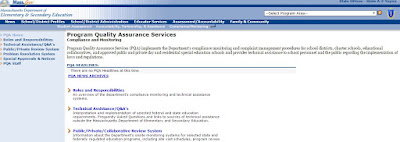"The state’s education commissioner, aiming to end a long-brewing controversy, is proposing to scrap a rule requiring school systems to develop individual ratings for teachers and administrators based solely on student test scores.
“I heard loud and clear from teacher unions and administrators that having a separate rating has more downsides then upsides,” Mitchell Chester, commissioner of elementary and secondary education, said in an interview.
His proposal, however, would not entirely do away with the use of student test scores in evaluating teachers and administrators, prompting mixed reaction to the proposal Tuesday.
Instead, it would require school systems to fold the scores into a separate system of judging educator performance: the annual job review, a process that has been based largely on observations, and a review of other evidence, such as lesson plans."
Continue reading the article online (subscription may be required)
http://www.bostonglobe.com/metro/2016/11/23/state-may-scrap-teacher-ratings-tied-test-scores/FMn4OSFqbuVvYFGSgyX8YM/story.html
The full agenda for the Massachusetts Board of Elementary and Secondary Education meeting scheduled for Tuesday, Nov 29, 2016 can be found here
http://www.doe.mass.edu/boe/docs/FY2017/2016-11/
| The Massachusetts Department of Elementary and Secondary Education |
"Importantly, the proposed amendments eliminate the separate student impact rating, but preserve a focus on student learning in the evaluation framework. This approach addresses the concerns about a separate student impact rating while retaining evidence of student learning based on multiple measures, including common assessments and statewide student growth measures, as a component of the educator's summative performance rating."http://www.doe.mass.edu/boe/docs/FY2017/2016-11/item2.html
Summary of Proposed Amendments
The proposed regulatory amendments include the following:
- Eliminating the separate student impact rating of high, moderate, or low, which was to be reported to the Department at the educator level.
- Retaining the 5-step cycle, which culminates in a summative performance rating based on multiple categories of evidence and the professional judgment of the evaluator. (See the attached Quick Reference Guide for more information about the evaluation process.)
- Establishing a "student learning indicator" under Standard II: Teaching All Students (for teachers) and under Standard I: Instructional Leadership (for administrators). Standards describe the broad categories of knowledge, skills and performance of effective practice, and indicators describe specific knowledge, skills, and performance for each standard. By including a student learning indicator, impact on student learning is a component of the rating for the Standard. The rating for the Standard, in turn, is a component of the Summative Performance Rating. The student learning indicator does not result in a separate stand-alone rating.
- Providing additional information about the types of measures that can be used as evidence of educator impact on student learning, including: a definition of common assessments, establishing the use of common assessments and statewide growth measures in the evaluation process as optional for educators who are not responsible for direct instruction, and clarity that other evidence of student learning beyond common assessments and statewide growth measures may be considered.
- Adding a new definition of "expected impact" on student learning to guide evaluators and educators in understanding the role of professional judgment in looking across multiple measures to understand an educator's impact on student learning.
In addition, the proposed amendments also include technical changes unrelated to the student impact rating, such as removing provisions describing timelines that have expired.
http://www.doe.mass.edu/boe/docs/FY2017/2016-11/item2.html


